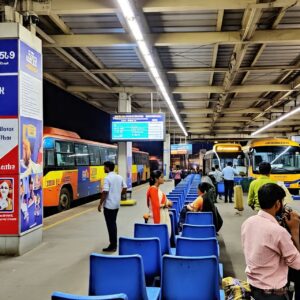In recent years, Bengaluru, India’s Silicon Valley, has witnessed rapid urbanization and an exponential increase in vehicle population. Consequently, traffic congestion, air pollution, and last-mile connectivity have become pressing challenges for city planners and residents alike. Recognizing these issues, the Karnataka government’s 2025 budget has set a transformative vision for urban mobility by committing to the deployment of 9,000 new electric buses for the Bangalore Metropolitan Transport Corporation (BMTC). This significant investment is a cornerstone in Karnataka’s larger plan to foster sustainable public transport and reduce carbon emissions.
A Green Leap Forward: 9,000 Electric Buses for Bengaluru
To begin with, the announcement of 9,000 electric buses marks one of the largest public transport electrification drives in India. The initiative is part of a broader goal to introduce 14,750 electric buses across Karnataka by 2025-26. Specifically, the buses will be deployed through flagship schemes such as PM e-Bus Sewa and the PM e-DRIVE Scheme, along with other externally aided mobility projects.
Moreover, the government is not only focusing on vehicle procurement but also prioritizing the development of supporting infrastructure. For instance, the rollout includes setting up advanced charging stations, upgrading bus depots, and creating robust maintenance facilities to ensure the longevity and efficiency of the electric fleet.
Furthermore, alongside electric buses, the budget allocates resources for the introduction of 1,000 new diesel buses under the Gross Cost Contract (GCC) model to serve routes where electric mobility infrastructure is still developing. This pragmatic approach ensures improved connectivity even in less accessible regions.
Why Electric Buses Matter for Bengaluru
Firstly, Bengaluru suffers from some of the highest air pollution levels among Indian metros, largely due to the proliferation of private vehicles and diesel-powered public transport. Transitioning to electric buses is essential to curb emissions and improve air quality.
Secondly, electric buses promise to lower operational costs for BMTC by reducing fuel expenses and maintenance needs. This economic benefit translates into potentially more affordable fares and improved service frequency, making public transport more attractive to commuters.
In addition, these buses contribute to noise reduction in a city where traffic noise pollution is a constant nuisance.
Enhancing Last-Mile Connectivity and Urban Mobility
Beyond vehicle electrification, the Karnataka government’s vision for 2025 underscores the importance of last-mile connectivity. Areas like Outer Ring Road (ORR), Sarjapur Road, and Electronics City are focal points for improving transit accessibility. To this end, feeder bus services, electric shuttles, and micro-mobility options like bike-sharing schemes are being expanded to ensure commuters can easily complete their journeys.
In addition to physical infrastructure improvements, the integration of intelligent transport systems (ITS) and digital platforms plays a critical role. Real-time tracking, unified ticketing systems, and mobility apps aim to provide a seamless travel experience.
Promoting Active Mobility: Walking and Cycling
Moreover, the government is actively promoting active mobility, encouraging walking and cycling through scientifically redesigned streets. Wider footpaths, dedicated cycling lanes, and traffic-calmed zones are integral to creating safer, healthier urban environments.
Urban mobility expert Chetan Sodaye highlights that such changes not only improve public health but also contribute to lowering vehicular pollution. “Promoting active mobility with well-designed infrastructure ensures that people choose greener and more sustainable options,” he notes.
Participatory Governance: Empowering Communities
Significantly, the transformation of Bengaluru’s transport system is not limited to infrastructure and vehicles. There is a growing emphasis on participatory governance to make mobility plans more inclusive and context-sensitive. Engaging communities through public consultations and digital feedback mechanisms ensures diverse voices are heard.
According to Chetan Sodaye, “Fostering co-creation and participatory governance empowers communities to shape mobility plans that reflect their needs and challenges.” This bottom-up approach fosters trust and leads to more successful implementation of transport initiatives.
The Broader Impact: Sustainable Development and Climate Goals
Importantly, Karnataka’s electric bus program aligns with India’s national climate goals and the global push for sustainable urban development. By reducing reliance on fossil fuels and lowering greenhouse gas emissions, Bengaluru contributes to fighting climate change.
Additionally, the shift to electric buses supports the Smart Cities Mission objectives by leveraging technology to enhance urban living quality.
Challenges and the Road Ahead
Nevertheless, the transition to electric buses is not without challenges. The state must ensure:
-
Adequate and reliable electricity supply, preferably from renewable sources
-
Efficient management of the charging infrastructure to avoid bottlenecks
-
Training for drivers and maintenance staff on electric vehicle technology
-
Public awareness campaigns to encourage acceptance of electric buses
Despite these hurdles, Karnataka’s commitment and proactive planning indicate a promising future for Bengaluru’s public transport.
Conclusion: A Model for Green Urban Mobility
To summarize, the Karnataka Budget 2025 heralds a new era for Bengaluru’s public transport system by introducing 9,000 electric buses as part of a comprehensive plan to enhance green mobility. This initiative not only addresses urgent environmental concerns but also improves connectivity, accessibility, and user experience.
With supportive infrastructure, active community involvement, and smart urban planning, Bengaluru is set to become a national model for sustainable and inclusive public transport. As other Indian cities observe this transformative journey, Karnataka’s vision could inspire a wider adoption of eco-friendly transport solutions across the country.


